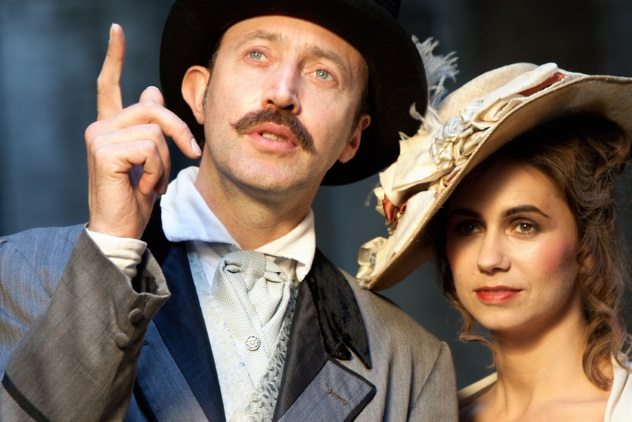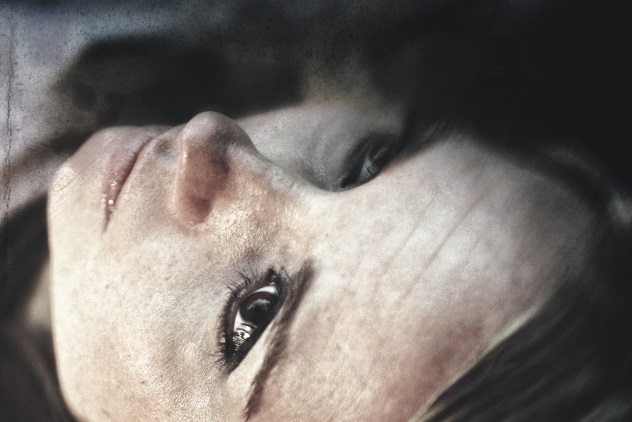While we seldom see scarecrows in their original form and in their natural elements today, there was a time when scarecrows were prevalent throughout Europe, Australia, and the United States. During these times, it was often hard to distinguish these mock humans from the living or, more often, from the recently deceased.
10 Swinging In The Breeze
Albert Engel made one heck of a realistic scarecrow back in Wisconsin in 1916, and all of his neighbors were so impressed with his work that they showed up on his doorstep to find out how he did it. Oddly enough, his family answered the door and said that Albert had not been home for the past few days. Disappointed, the neighbors left for the day, but word got out about the wonderful, almost lifelike scarecrow hanging from the tree in the cornfield. The next morning, another neighbor was riding by the cornfield when he decided to stop and check out the scarecrow everyone was talking about, but as he came closer to the hanging scarecrow, he realized something was not quite right. The dummy wore a wide-brimmed hat, concealing its true face from passersby, but up close, the curious neighbor could plainly see that the scarecrow was actually Albert Engel himself. Police were called to the scene, and Albert’s death was ruled a suicide. He never took off his hat when he hung himself from the tree branch, and it was believed that scores of people had passed by his hanging body, believing it to be a harmless scarecrow meant to shoo the birds away.[1]
9 Thrown Onto A Bonfire
Clearing out fields is tiresome work and can get rather monotonous after a few hours. In 1953, a group of workmen were clearing the fields in Llangain, Wales. They were gathering up all the old debris and tossing it into a bonfire. At one point, the men found an old scarecrow in some undergrowth. They wrenched its old corpse out and tossed it into the fire with the rest of the junk, but as the scarecrow’s old, tattered clothes began to burn away, some of the men spotted the bone underneath. Jolted out of their humdrum work, the men returned to the place where the scarecrow was found and discovered a skull and a set of false teeth. While it was too late to rescue the dry, burning bones, police were able to identify the body from the dentures. They were made for one Ethel Winifred Collins, aged 66, who had been sadly missing for several months.[2]
8 Brained And Torn Apart
Some people should live in homes where there are no neighbors in sight, while others are simply too crazy to live next to. For instance, Mary Haman of California hated the very sight of her neighbor, Luigi Lugo. Whether it was something he did, how he acted, or through no fault of his own, we will never know, but his face so infuriated Mary that when he put up a scarecrow in 1911 that looked almost exactly like himself, Mary simply went nuts. She trudged over to his home, grabbed hold of the scarecrow, and “brained it, beheaded it and tore it limb from limb.” The poor scarecrow was totally dismembered, and Mary was arrested for battery. When Mary was brought face-to-face with the judge, it was decided that she should be set free. After all, it was a “bloodless murder,” but we are all left to ponder whether Mary and Luigi ever came to a truce or spent the rest of their days torturing each other in petty neighborhood wars.[3]
7 Nearly An Entire Regiment Lured To Their Death
It was 1914, and World War I was in its first year. The French were on the move, but so was the nearby Baden Regiment. The French force knew they had to think fast if they were to survive another day. The fog was thick, and the French realized it could be used to their advantage. The men rushed into a nearby field and, gathering sticks and other field debris, made scarecrows that, from a distance in the fog, looked like helpless soldiers. They placed their caps on the stick scarecrows, and the men hid themselves, ready to ambush the enemy. A few of the French were sent ahead and lured the German troops to the field. At the sight of the scarecrow figures, the Germans charged. As soon as the Germans were well into the trap, shots rang out from three sides. Over 100 men of the Baden Regiment were killed, and as the war went on, scarecrows and trench dummies became more and more common as a way to trick the enemy soldiers.[4]
6 An Offering To The Waters
B.C. Rogers and his wife were heading home by horse and buggy one Sunday afternoon in 1903 when, from across the river, they saw a boy and a woman standing along the bank. Then, to their absolute horror, they saw the boy lift the woman into his arms and toss her into the wild rapids. Barely able to believe his eyes, Mr. Rogers stopped his horses and ran to the water’s edge. He looked to find the woman, but he could not see a single trace of her. When he looked up, he saw the boy run off and vanish into the Vermont scenery. Feeling as though he had to do something, Rogers ran to the nearest village and returned with two men to help him find the body of the woman. Still, no trace of her could be found. Rogers eventually returned to the buggy, took the reins, and rode to the nearest farm across the river. There, he talked to the farmer and soon discovered that the farmer’s grandson had taken the old scarecrow to the river’s bank and tossed it in.[5]
5 The Incredible Rescue
Two men, according to a Perth newspaper article published in 1940, were taking a stroll through a Sussex meadow one night when they came upon a plank bridge that crossed a stream. The men began to walk across the planks when, to their horror, a body floated beneath them. The men had to be in shock at the sight, but it did not stop them from being brave. They quickly got off the bridge, ran to the water’s bank, and took off their shoes and socks. Together, the men waded into the water and grabbed hold of the body. When they got the body to the water’s edge, they lifted it and heaved it onto the bank. There, they discovered in the darkness that the victim was no ordinary human. They had rescued a scarecrow that had somehow made its way into the stream as either a prank or as a means of disposal.[6]
4 Mistaken Identity
Maud Heufnagle and her friend were walking through a Pennsylvania cornfield on their way to church one Sunday morning in 1909 when Maud spotted something lying on the ground. “Look,” she said, “somebody has knocked over papa’s scarecrow.” Maud walked over to set the scarecrow back up, but when she reached it, she screamed and fainted. Her friend ran to her and discovered that the scarecrow was actually the mutilated body of Maud’s father. Charles Heufnagle was walking home through the cornfield when he was attacked. The police were able to determine that there was a fierce struggle between Charles and his attackers. Charles failed to overcome the other men, and his body was hacked to pieces. All of the farmer’s money and valuable papers were taken from his pockets. It was clearly a brutal robbery, but the sheer shock value of the story led to it being printed in newspapers across the country.[7]
3 A Stone’s Throw Away
Take any smooth body of water and add a bunch of stones to the mix, and you can bet there will be kids standing around throwing the stones into the water. Give them a target, and they will be busy for hours. That is sort of what happened at the reservoir in Beaufort, Victoria, back in 1908. It was about 4:00 PM, and a bunch of boys were throwing stones into the reservoir. They noticed a coat and hat floating in the deep and used it as a target for about two hours. The boys thought they were pelting a discarded scarecrow until someone decided to check the scarecrow out. That was when the body of John Cuthbertson was discovered. At the inquest, it was believed that John may have drowned himself. He was a retired engineer and had previously made a statement that he was done with this life. No follow-up was given on the stone-throwers, however one can easily imagine that the discovery had made them think twice about pelting anything with a human-like shape.[8]
2 The Remains Of The Lost
Australia must have been littered with scarecrows hanging from the trees in the early half of the 1900s because barely anyone took notice of them until they turned out to actually be the bodies of some poor lost souls. In 1924, a boy was searching for his cattle around Smithfield, New South Wales, when he came across what he thought was a scarecrow hanging from a fig tree. He told his father about it, and the father, being wiser, contacted the police and returned with them to the spot. There, they found the hanging body of Charles Valentine Lamb, aged 54.[9] Later in 1935, boys reported seeing a scarecrow hanging from a fig tree in Clontarf, Queensland. A few days later, a man also spotted the scarecrow and went to investigate it. He found it to be the body of a suicide victim. The police were notified, and the body was taken to the morgue.
1 The Wife Will Do
Women scarecrows were seldom made in the recent past, but in the early 1900s, there were some gruesome reports of very real female scarecrows. For example, in 1906, a newspaper article made its rounds throughout the United States telling of a Hungarian farmer, Eugene Plozy, who was such a penny-pincher that when his wife passed away, he took her body and set it up in his orchard. It was discovered that he was using her body to scare the birds away from his fruit trees. Again, this time in Amsterdam in 1910, it was reported that a farmer’s wife passed away. While the marriage appeared to have been a happy one, the farmer reportedly loved his crops more than her. After she died, he dressed her corpse in one of his old suits and set her up in the orchard behind his house to scare off the birds. The neighbors spotted the scarecrow wife two days later and reported the husband to the authorities. The farmer caught wind of the neighbors’ discovery, so the wife was, of course, nowhere to be found.[10] Elizabeth, a former Pennsylvania native, recently moved to the beautiful state of Massachusetts where she is currently involved in researching early American history. She writes and travels in her spare time.
























